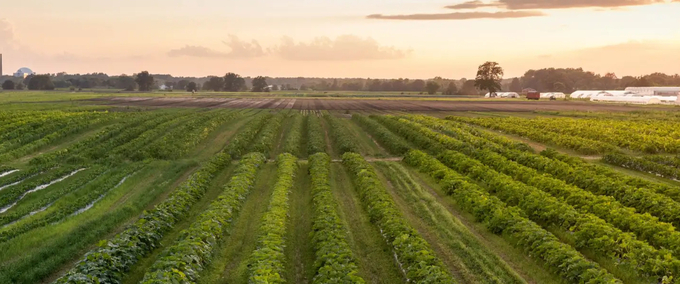June 2, 2025 | 06:49 GMT +7
June 2, 2025 | 06:49 GMT +7
Hotline: 0913.378.918
June 2, 2025 | 06:49 GMT +7
Hotline: 0913.378.918

The Chef's Garden in Ohio.
Photo: Courtesy The Chef's Garden
Bob Jones is the third generation in his family to run The Chef’s Garden, a 300-acre farm in Ohio that has used regenerative agriculture methods for the last 10 years.
“Our belief is that modern agriculture in the United States is broken, both economically and agronomically,” said Jones. The model for decades has been to go to the bank and borrow operating capital with the hope that it can all be paid back, a cycle of debt that makes it difficult for farms to be financially sustainable. “That’s how we’ve gotten to a tremendously shrinking number of farms in the United States,” said Jones.
To combat that, the Jones family decided to veer away from the conventional farming model. Instead, they invested in regenerative methods like rotating fields in thirds: land for crops to be harvested, land to be filled with cover crops, and land to be left alone. The result is soil that has time to recover, regain microbes that keep the soil healthy, and grow higher quality produce that has gained a reputation. (The farm now provides produce for Michelin Star restaurants across the country.)
Farmers at The Chef’s Garden are also experimenting with new methods to scale up their operations while maintaining the fields. “To see these guys doing regenerative practices on a major scale was shocking,” said Dr. Nasha Winters, a naturopathic doctor who recently toured The Chef’s Garden. “They took us through all these growing environments, from microgreens to various indoor and outdoor crops, different temperature greenhouses and lighting processes—how technology is meeting traditional old farming practices was cool to see.”
At the end of the tour, Winters watched produce being packaged for shipment. She was in awe as she saw recipients that included top chefs at places like the Four Seasons and the Ritz-Carlton. “You’re recognizing that people are willing to pay top dollar and that this can compete with conventional farming,” said Winters. “But they also allow a more cost-affordable approach to eating really healthy.”
Connecting soil to human health
For decades, farmers have leaned on chemical fertilizers and pesticides to yield larger amounts of monocrops. The more robust harvests help farmers pay back start-up loans and turn profits. But decades of chemicals have ruined soils, making them less capable of providing nourishment for the crops, and lessening their nutritional value as a result.
They also can have adverse affects on humans. Winters is an expert in metabolic oncology, metabolic health, and terrain health. Diagnosed with cancer at 19, Winters was baffled as to how she, a young person in rural Kansas, could be struck with such a disease. She believes her exposure to big farms using pesticides contributed to her diagnosis.
Now in her fifties, Winters advocates for holistic health practices. “You have to go out of your way to seek out and ingest healthy food today,” she said. “To tell the average American or anybody in a western developed country to eat healthy, that leaves a ton of room for interpretation.”
When trying to eat healthy, we often tend to look at the produce itself, but the quality of the soil in which it was grown is more indicative of a plant’s nutritional value.
(QZ)

(VAN) Vikas Rambal has quietly built a $5 billion business empire in manufacturing, property and solar, and catapulted onto the Rich List.

(VAN) Available cropland now at less than five percent, according to latest geospatial assessment from FAO and UNOSAT.

(VAN) Alt Carbon has raised $12 million in a seed round as it plans to scale its carbon dioxide removal work in the South Asian nation.

(VAN) Attempts to bring down the price of the Japanese staple have had little effect amid a cost-of-living crisis.

(VAN) Fourth most important food crop in peril as Latin America and Caribbean suffer from slow-onset climate disaster.

(VAN) Shifting market dynamics and the noise around new legislation has propelled Trouw Nutrition’s research around early life nutrition in poultry. Today, it continues to be a key area of research.

(VAN) India is concerned about its food security and the livelihoods of its farmers if more US food imports are allowed.